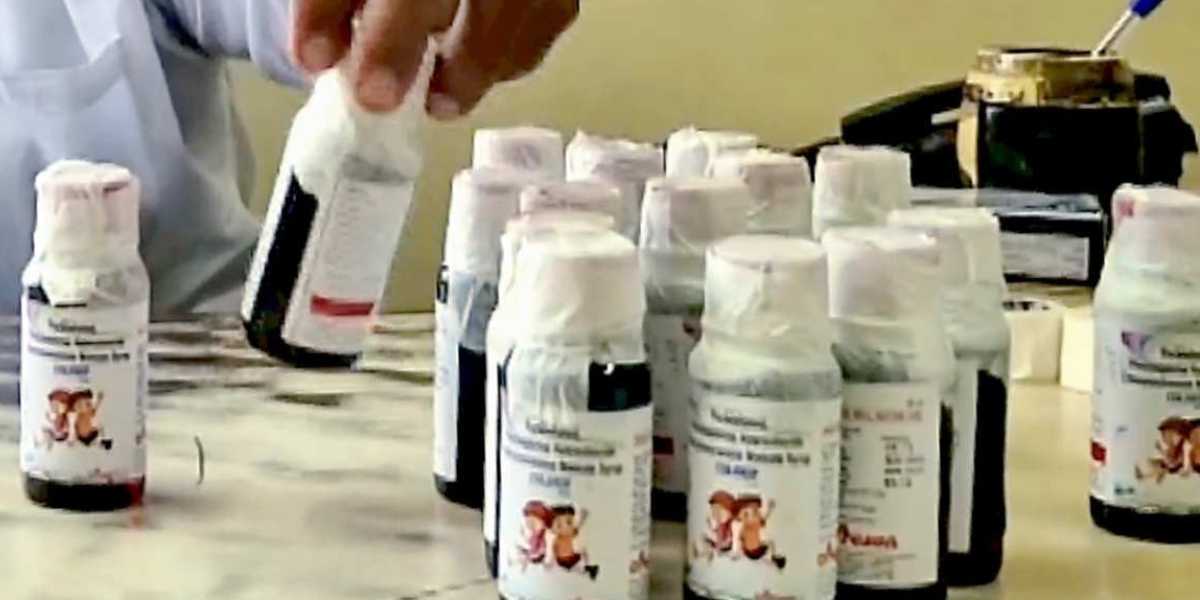Published Oct 09, 2025 | 12:41 PM ⚊ Updated Oct 09, 2025 | 12:41 PM

Laboratory analysis confirmed that Batch No. SR-13 contained 48.6 percent w/v of diethylene glycol, nearly 500 times above the permissible limit.
Synopsis: Former employees and local distributors told investigators that quality checks had become irregular recently and that the company’s testing records were incomplete.
The Madhya Pradesh police on Thursday, 9 October, arrested G Ranganathan, 73, owner of Tamil Nadu-based Sresan Pharmaceuticals, in connection with the deaths of at least 21 children allegedly caused by the company’s Coldrif cough syrup.
Ranganathan, a Chennai-based businessman and a graduate of Madras Medical College, was taken into custody from his Kodambakkam residence early Thursday morning by a seven-member police team from Madhya Pradesh. He will be produced before a Chennai court later today before being taken to the Chhindwara district, where most of the deaths have been reported.
Officials confirmed that a criminal case had already been registered against Sresan Pharmaceuticals after laboratory tests revealed dangerously high levels of diethylene glycol (DEG), a toxic industrial chemical, in a batch of Coldrif syrup distributed in Madhya Pradesh and Rajasthan.
Police had earlier announced a ₹20,000 reward for information leading to Ranganathan’s arrest.
The investigation into the tragedy began in September 2025, when several children in Madhya Pradesh’s Chhindwara and neighbouring districts were hospitalised with symptoms of acute kidney failure after consuming Coldrif syrup.
Laboratory analysis later confirmed that Batch No. SR-13 contained 48.6 percent w/v of diethylene glycol, nearly 500 times above the permissible limit.
DEG, commonly used in antifreeze and brake fluid, is highly toxic to humans and has a history of causing fatal poisoning outbreaks worldwide.
The contaminated batch has now been linked to at least 21 deaths — 19 in Madhya Pradesh and two in Rajasthan — according to officials familiar with the investigation.
Following the alert from Madhya Pradesh authorities, the Tamil Nadu Drugs Control Department launched an emergency inspection of Sresan Pharmaceuticals’ manufacturing facility in Kanchipuram on 1 October 2025.
The inspection uncovered a shocking 400 regulatory violations, including 39 critical and 325 major non-compliances under India’s Revised Schedule M (Good Manufacturing Practices) and Schedule L1 (Good Laboratory Practices) of the Drugs Rules, 1945.
Officials reported unhygienic conditions, leaking machinery, inadequate documentation, and the use of non-pharma-grade raw materials. Tests confirmed that the propylene glycol used in Coldrif’s production was contaminated with diethylene glycol.
In response, the Drugs Control Department froze existing stocks, suspended production, and initiated criminal proceedings against the company.
“The department is committed to protecting public health and ensuring strict legal action against violators,” said S Gurubharathi, Deputy Director of the Drugs Control and Licensing Authority, Tamil Nadu.
The department said it received information from the Madhya Pradesh Drugs Control Authority at 3:37 pm on 1October even though the day — along with 2 October — was a government holiday. However, acting “in the public interest,” officials said an emergency team began the on-site inspection at 4 pm the same day.
“Rapid testing was undertaken by the Government Drugs Testing Laboratory, Chennai, with top priority, even during the holidays,” Gurubharathi said.
By 3 October, the lab confirmed the presence of dangerously high DEG levels, prompting an immediate stop-production order and a show-cause notice for licence cancellation. Communication was also sent to Odisha and Puducherry authorities to recall distributed stocks of the same batch.
Sresan Pharmaceuticals’ Kanchipuram unit has reportedly been operating since 1990, but officials have not clarified how the facility managed to function for over three decades without significant regulatory scrutiny.
The latest inspection findings have raised concerns about systemic failures within India’s state drug regulatory systems, especially in Tamil Nadu, where key leadership positions remain vacant and several drug inspector posts unfilled.
Experts point out that India’s fragmented regulatory framework — where state authorities oversee licensing and inspections, while the Central Drugs Standard Control Organisation (CDSCO) handles national approvals — often results in poor interstate coordination and delayed enforcement.
This is not the first such tragedy linked to contaminated syrups in India. Over the past two years, multiple DEG poisoning incidents have been reported including fatal cases in The Gambia and Uzbekistan, where Indian-made syrups were implicated. The latest episode underscores persistent concerns about quality control lapses in small and mid-sized pharmaceutical units.
Ranganathan, who has been in the pharmaceutical business for over four decades, first made his name with Pronit, a nutritional tonic that was once popular in Chennai. His company, Sresan Pharmaceuticals, expanded its portfolio to include paediatric and over-the-counter formulations, including Coldrif.
However, former employees and local distributors told investigators that quality checks had become irregular in recent years and that the company’s testing records were incomplete.
Police sources said Ranganathan will face charges under the Indian Penal Code (IPC) and the Drugs and Cosmetics Act, including offences related to culpable homicide, manufacturing substandard drugs, and endangering public life.
As of Thursday, the Madhya Pradesh police confirmed that Ranganathan will be produced before a magistrate in Chennai and taken to Chhindwara once transit remand is secured. Investigators are also pursuing senior quality control staff and suppliers who provided contaminated raw materials.
Authorities in Tamil Nadu, meanwhile, have sealed the Sresan Pharmaceuticals facility and are preparing a comprehensive report for the Union Ministry of Health and Family Welfare.
“The department acted immediately and will continue to do so until all responsible parties are held accountable,” Gurubharathi said.
(Edited by Majnu Babu).

